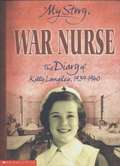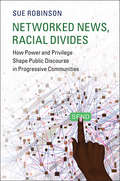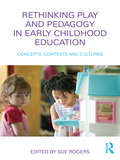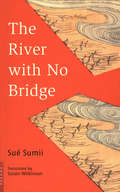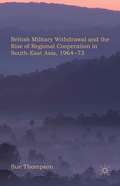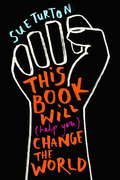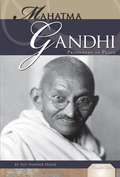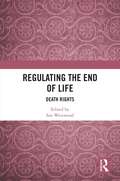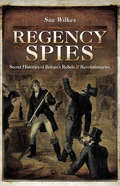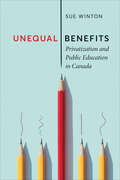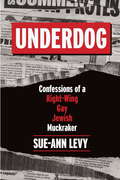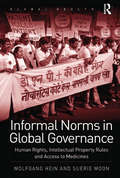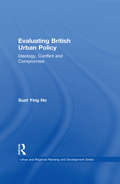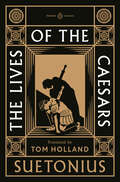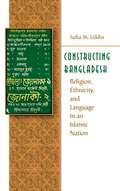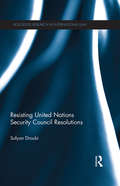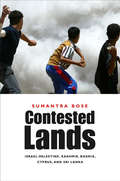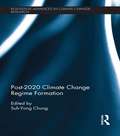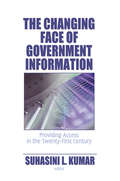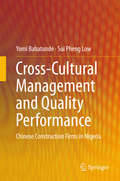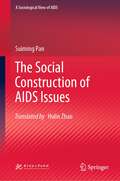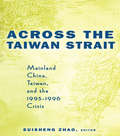- Table View
- List View
War Nurse: The Diary of Kitty Langley, 1939-1940 (My Story)
by Sue ReidThis is the diary of Kitty, an 18-year-old VAD (Voluntary Aid Detachment), during the years of 1939 and 1940. As a nurse working in the military hospitals in the south of England, Kitty sees at close hand the effects of war - notably the casualties of Dunkirk. The diary details the historical events and describes the day to day life of a young VAD in a military hospital in WWII. It's also a story about growing up. She is a girl transposed from a comfortable protected existence into the harsher world of a wartime hospital who begins to learn a bit about life and relationships.
Communication, Society and Politics: How Power and Privilege Shape Public Discourse in Progressive Communities (Communication, Society and Politics)
by Sue RobinsonAgainst conventional wisdom, pervasive black-white disparities pair with vitriolic public conversation in politically progressive communities throughout America. Networked News, Racial Divides examines obstacles to public dialogues about racial inequality and opportunities for better discourse in mid-sized, liberal cities. The book narrates the challenges faced when talking about race through a series of stories about each community struggling with K-12 education achievement gaps. Media expert Sue Robinson applies Bourdieusian field theory to understand media ecologies and analyze whose voices get heard and whose get left out. She explores how privilege shapes discourse and how identity politics can interfere with deliberation. Drawing on network analysis of community dialogues, interviews with journalists, politicians, activists, and citizens and deep case study of five cities, this reflexive and occasionally narrative book chronicles the institutional, cultural and other problematic realities to amplifying voices of all people while also recommending strategies to move forward and build trust.
Rethinking Play and Pedagogy in Early Childhood Education: Concepts, Contexts and Cultures
by Sue RogersBringing together a collection of chapters from international experts in the field of early childhood education, Rethinking Play and Pedagogy in Early Childhood Education seeks to explore how play in the Early Years is valued as a means of learning. The book discusses how play is presented, transformed by institutional and pedagogical discourses and ultimately experienced by children. Adopting cultural, conceptual and contextual approaches to play and pedagogy across its chapters, this book addresses contemporary emerging issues surrounding play and pedagogy including: the application of critical and socio-cultural analyses to play in early childhood renewed interest in the aesthetic, creative and affective dimensions of play in early childhood education competing discourses of ‘performativity’, market forces, social reconstruction and child-centredness children’s voice and participation within educational settings globalization, migration and cultural pluralism the role of digital technology in early childhood education diversity, identity and social justice within early childhood settings. With international appeal and relevance, this book will be of interest to students taking undergraduate, Masters and doctoral courses in early childhood education, childhood and education studies as well as academic teachers and researchers, policy-makers and international agencies working with young children.
The River With No Bridge
by Susan Wilkinson Sue SumiiThe River With No Bridge (Hashi no nai kawa) explores with outspoken frankness a subject still taboo in Japan: the intolerance and bigotry faced daily by Japan's largest minority group, the burakumin. Racially no different from other Japanese, over the centuries the burakumin have been cruelly ostracized for their association with occupations considered defiling. Spanning the years 1908 to 1924, the original six volumes of this novel trace the developing awareness of burakumin of their rights and dignity as human beings. Volume 1, translated into English for the first time in 1990, is a story about childhood in a burakumin village.
The River With No Bridge
by Susan Wilkinson Sue SumiiThe River With No Bridge (Hashi no nai kawa) explores with outspoken frankness a subject still taboo in Japan: the intolerance and bigotry faced daily by Japan's largest minority group, the burakumin. Racially no different from other Japanese, over the centuries the burakumin have been cruelly ostracized for their association with occupations considered defiling. Spanning the years 1908 to 1924, the original six volumes of this novel trace the developing awareness of burakumin of their rights and dignity as human beings. Volume 1, translated into English for the first time in 1990, is a story about childhood in a burakumin village.
British Military Withdrawal and the Rise of Regional Cooperation in South-East Asia, 1964�73
by Sue ThompsonThis book examines the links between Britain's withdrawal from its east of Suez role and the establishment of South-East Asian regional security arrangements. The link between these two events is not direct, but a relationship existed, which is important to a wider understanding of the development of regional security arrangements.
This Book Will (Help You) Change the World
by Sue TurtonProtest injustice. Campaign for change. Stand up for your future.Political turmoil, shocks and upsets have rocked the world in the past few years, and it has never been more important to find your voice and stand up for what you believe in. From award-winning journalist Sue Turton, with hilarious illustrations from activist illustrator Alice Skinner, this is a powerhouse guide to politics and activism for teens everywhere. Featuring contributions from C4 anchor Jon Snow, Avaaz.com founder Jeremy Heimans, leader of Hong Kong's Umbrella Revolution Joshua Wong and more, Turton discusses the political system that rules our daily lives and exposes its flaws. She also gives readers all the inspiration and empowerment they need to get out there, challenge the status quo and change the world themselves. Be it disrupting the system from within by joining political parties or inspiring change through protest, Turton shows young activists how their actions and words really can make a difference. With a toolkit demonstrating how to avoid fake news, triumph in debates and grab the spotlight for your campaign, this is the ultimate teen guide to changing the world.
Mahatma Gandhi: Proponent of Peace (Essential Lives)
by Sue Vander HookEssential Lives introduces the people who have shaped the world, impacted humanity, and changed the course of history. Mahatma Gandhi is a biography of a freedom fighter of India who was leading the Freedom Movement to get rid of British Rule. His name was Mohandas Karamchand Gandhi, but people all over the world called him Mahatma--the "Great Soul." To his followers in India, he was Bapu--"Father" or "Father of the Nation."
Regulating the End of Life: Death Rights
by Sue WestwoodDeath Rights is a collection of cutting-edge chapters on assisted dying and euthanasia, written by leading authors in the field. Providing an overview of current regulation on assisted dying and euthanasia, both in the UK and internationally, this book also addresses the associated debates on ethical, moral and rights issues. It considers whether, just as there is a right to life, there should also be a right to death, especially in the context of unbearable human suffering. The unintended consequences of prohibitions on assisted dying and euthanasia are explored, and the argument put forward that knowing one can choose when and how one dies can be life-extending, rather than life-limiting. Key critiques from feminist and disability studies are addressed. The overarching theme of the collection is that death is an embodied right which we should be entitled to exercise, with appropriate safeguards, as and when we choose. Making a novel contribution to the debate on assisted dying, this interdisciplinary book will appeal to those with relevant interests in law, socio-legal studies, applied ethics, medical ethics, politics, philosophy, and sociology.
Regency Spies: Secret Histories of Britain's Rebels & Revolutionaries
by Sue WilkesSue Wilkes reveals the shadowy world of Britain's spies, rebels and secret societies from the late 1780s until 1820. Drawing on contemporary literature and official records, Wilkes unmasks the real conspirators and tells the tragic stories of the unwitting victims sent to the gallows. In this 'age of Revolutions', when the French fought for liberty, Britain's upper classes feared revolution was imminent. Thomas Paine's incendiary Rights of Man called men to overthrow governments which did not safeguard their rights. Were Jacobins and Radical reformers in England and Scotland secretly plotting rebellion? Ireland, too, was a seething cauldron of unrest, its impoverished people oppressed by their Protestant masters. Britain's governing elite could not rely on the armed services even Royal Navy crews mutinied over brutal conditions. To keep the nation safe, a 'war chest' of secret service money funded a network of spies to uncover potential rebels amongst the underprivileged masses. It had some famous successes: dashing Colonel Despard, friend of Lord Nelson, was executed for treason. Sometimes in the deadly game of cat-and-mouse between spies and their prey, suspicion fell on the wrong men, like poets Wordsworth and Coleridge. Even peaceful reformers risked arrest for sedition. Political meetings like Manchester's 'Peterloo' were ruthlessly suppressed, and innocent blood spilt. Repression bred resentment and a diabolical plot was born. The stakes were incredibly high: rebels suffered the horrors of a traitor's death when found guilty. Some conspirators' secrets died with them on the scaffold... The spy network had some famous successes, like the discoveries of the Despard plot, the Pentrich Rising and the Cato St conspiracy. It had some notable failures, too. However, sometimes the 'war on terror' descended into high farce, like the 'Spy Nozy' affair, in which poets Wordsworth and Coleridge were shadowed by a special agent.
Unequal Benefits: Privatization and Public Education in Canada (UTP Insights)
by Sue WintonDrawing on research from across Canada and beyond, education policy expert Sue Winton critically analyzes policies encouraging the privatization of public education in Canada. These policies, including school choice, fundraising, fees, and international education, encourages parents and others in the private sector to take on responsibilities for education formerly provided by governments with devastating consequences for the democratic goals of public education. Unequal Benefits introduces traditional and critical approaches to policy research and explains how to conduct a critical policy analysis. Winton explains the role policy plays in supporting and challenging inequality in the pursuit of a strong democracy and the public school ideal. In these idealized education spaces, policy decisions prioritize collective needs over private interests, which are made in public by democratically elected officials, and, more importantly, every child is able to access high quality education programs and enjoy their benefits at no cost. Written for parents, educators, policymakers, and other interested citizens, Unequal Benefits sheds light on how to participate in efforts to resist educational privatization and achieve the public school ideal across Canada.
Language Policy and Language Planning: From Nationalism To Globalisation
by Sue WrightThis revised second edition is a comprehensive overview of why we speak the languages that we do. It covers language learning imposed by political and economic agendas as well as language choices entered into willingly for reasons of social mobility, economic advantage and group identity.
Underdog: Confessions of a Right-Wing Gay Jewish Muckraker
by Sue-Ann LevyHold onto your hats: popular and controversial Toronto city journalist Sue-Ann Levy -- a self-described nice, chubby, Jewish, gay, conservative girl -- takes on the establishment and establishment thinking in this provocative, honest, and insightful memoir that will surprise her fans and foes alike.Sue-Ann Levy was born to a traditional patriarchal Jewish family in which the son was considered accomplished simply for being born, and she realized from an early age that she would not fit into the mold designated for her. An outspoken, right-wing lipstick lesbian, Levy has spent her life challenging the status quo -- from championing the underdog, to taking on the Liberal left, to running as the first openly gay candidate for the Ontario Progressive Conservative party in 2009. Underdog chronicles Levy's journey through Toronto politics with the same candid, humorous, and self-deprecating approach for which she has become famous for in her daily columns. Persuasive and timely, Sue-Ann Levy will inspire readers to speak up against the inequalities in our political and justice systems.
Informal Norms in Global Governance: Human Rights, Intellectual Property Rules and Access to Medicines (Global Health)
by Wolfgang Hein Suerie MoonHein and Moon take up a serious problem of contemporary global governance: what can be done when international trade rules prevent the realization of basic human rights? Starting in the 1990s, intellectual property obligations in trade agreements required many developing countries to begin granting medicines patents, which often rendered lifesaving drugs unaffordable. At stake was the question of what priority would be given to health-particularly of some of the world’s poorest people-and what priority to economic interests, particularly those of the most powerful states and firms. This book recounts the remarkable story of the access to medicines movement. The authors offer an explanation for how the informal, but powerful norm that every person should have access to essential medicines emerged after a decade of heated political contestation and against long odds. They also explore the stability and scope of the norm. Finally, the book examines the limitations of informal norms for protecting human rights, and when renewed focus on changing formal norms is warranted.
Evaluating British Urban Policy: Ideology, Conflict and Compromise (Urban and Regional Planning and Development Series)
by Suet Ying HoSince the Conservative government of the late 70s introduced its stringent spending policy, a 'value for money' ideology has dictated most new approaches to policy management. As a result, monitoring and evaluation have become an integral part in the policy process. Focusing on the experience of British Urban Policy, this book examines the theoretical and practical issues in the monitoring or evaluation of public policy. It argues that as a result of the 'value for money' ideology influencing urban policy in Britain, various conflicts have arisen in both policy and implementation, and compromises have had to be made. By exploring the experiences of monitoring and evaluating urban policy, the book examines key issues such as changing approaches, the interface between monitoring and evaluation, and the utilization of monitoring information and evaluation studies. It concludes that a long-term evaluation strategy is required in order to improve the utility value of evaluation studies vis-a-vis policy formulation at the national level and implementation at the local level.
How to Be a Bad Emperor: An Ancient Guide to Truly Terrible Leaders (Ancient Wisdom for Modern Readers)
by SuetoniusWhat would Caligula do? What the worst Roman emperors can teach us about how not to leadIf recent history has taught us anything, it's that sometimes the best guide to leadership is the negative example. But that insight is hardly new. Nearly 2,000 years ago, Suetonius wrote Lives of the Caesars, perhaps the greatest negative leadership book of all time. He was ideally suited to write about terrible political leaders; after all, he was also the author of Famous Prostitutes and Words of Insult, both sadly lost. In How to Be a Bad Emperor, Josiah Osgood provides crisp new translations of Suetonius's briskly paced, darkly comic biographies of the Roman emperors Julius Caesar, Tiberius, Caligula, and Nero. Entertaining and shocking, the stories of these ancient anti-role models show how power inflames leaders' worst tendencies, causing almost incalculable damage.Complete with an introduction and the original Latin on facing pages, How to Be a Bad Emperor is both a gleeful romp through some of the nastiest bits of Roman history and a perceptive account of leadership gone monstrously awry. We meet Caesar, using his aunt's funeral to brag about his descent from gods and kings—and hiding his bald head with a comb-over and a laurel crown; Tiberius, neglecting public affairs in favor of wine, perverse sex, tortures, and executions; the insomniac sadist Caligula, flaunting his skill at cruel put-downs; and the matricide Nero, indulging his mania for public performance.In a world bristling with strongmen eager to cast themselves as the Caesars of our day, How to Be a Bad Emperor is a delightfully enlightening guide to the dangers of power without character.
The Lives of the Caesars (A Penguin Classics Hardcover)
by SuetoniusA masterful new translation of Suetonius' renowned biography of the twelve Caesars, bringing to life a portrait of the first Roman emperors in stunning detailA Penguin ClassicThe ancient Roman empire was the supreme arena, where emperors had no choice but to fight, to thrill, to dazzle. To rule as a Caesar was to stand as an actor upon the great stage of the world. No biographies invite us into the lives of the Caesars more vividly or intimately than those by Gaius Suetonius Tranquillus, written from the center of Rome and power, in the early 2nd century AD.By placing each Caesar in the context of the generations that had gone before, and connecting personality with policy, Suetonius succeeded in painting Rome&’s ultimate portraits of power. The shortfalls, foreign policy crises and sex scandals of the emperors are laid bare; we are shown their tastes, their foibles, their eccentricities; we sit at their tables and enter their bedrooms. The result is perhaps the most influential series of biographies ever written.That Rome lives more vividly in people's imagination than any other ancient empire owes an inordinate amount to Suetonius. Now award-winning author and translator Tom Holland brings us even closer in a new, spellbinding translation. Giving a deeper understanding of the personal lives of Rome&’s first emperors, and of how they swayed the fates of millions, The Lives of the Caesars is an astonishing, immersive experience of a time and culture at once familiar and utterly alien to our own.
Constructing Bangladesh
by Sufia M. UddinHighlighting the dynamic, pluralistic nature of Islamic civilization, Sufia M. Uddin examines the complex history of Islamic state formation in Bangladesh, formerly the eastern part of the Indian province of Bengal. Uddin focuses on significant moments in the region's history from medieval to modern times, examining the interplay of language, popular and scholarly religious literature, and the colonial experience as they contributed to the creation of a unique Bengali-Islamic identity.During the precolonial era, Bengali, the dominant regional language, infused the richly diverse traditions of the region, including Hinduism, Buddhism, and, eventually, the Islamic religion and literature brought by Urdu-speaking Muslim conquerors from North India. Islam was not simply imported into the region by the ruling elite, Uddin explains, but was incorporated into local tradition over hundreds of years of interactions between Bengalis and non-Bengali Muslims. Constantly contested and negotiated, the Bengali vision of Islamic orthodoxy and community was reflected in both language and politics, which ultimately produced a specifically Bengali-Muslim culture. Uddin argues that this process in Bangladesh is representative of what happens elsewhere in the Muslim world and is therefore an instructive example of the complex and fluid relations between local heritage and the greater Islamic global community, or umma.
Resisting United Nations Security Council Resolutions (Routledge Research in International Law)
by Sufyan DroubiThe United Nations Security Council has primary responsibility for maintaining international peace and security. In discharging its powers it must act in accordance with the Purposes and Principles of the UN, and observe the rules governing voting and procedure established in the Organisation’s Charter. The Council adopts mandatory resolutions that may establish obligations for members and non-members, and such obligations trump conflicting obligations originating from any other international agreement. Member States must cooperate with the Organisation and among themselves, in the implementation of any action prescribed by the Council against States whose behaviour the Council considers an act of aggression, or a threat to, or breach of, international peace and security. This book analyses resistance to Security Council resolutions and puts forward a theory of lawful resistance. Sufyan Droubi takes a positivist approach to the UN Charter regarding it as a constitution. Special emphasis is placed on the construction of the Charter’s meaning through the practice of both organs and Members of the UN and on the need to enhance the effectiveness of the Organization with due respect to the rule of law. The book proposes that nonviolent resistance to a mandatory resolution of the Security Council, on grounds that the latter is incompatible with the Charter or jus cogens norms, may be considered lawful under the Charter if some elements are present. In exploring a number of case studies of individual and collective State resistance to mandatory Council resolutions, the book proposes that resistance may function as a rudimentary instrument of accountability and protection of the Charter and jus cogens, in the absence of more mature mechanisms of judicial review. The book will be of excellent use and interest to scholars and students of constitutional international law and international relations.
His Majesty’s Opponent: Subhas Chandra Bose and India's Struggle against Empire
by Sugata BoseThe man whom Indian nationalists perceived as the “George Washington of India” and who was President of the Indian National Congress in 1938–1939 is a legendary figure. Called Netaji (“leader”) by his countrymen, Subhas Chandra Bose struggled all his life to liberate his people from British rule and, in pursuit of that goal, raised and led the Indian National Army against Allied Forces during World War II. His patriotism, as Gandhi asserted, was second to none, but his actions aroused controversy in India and condemnation in the West. Now, in a definitive biography of the revered Indian nationalist, Sugata Bose deftly explores a charismatic personality whose public and private life encapsulated the contradictions of world history in the first half of the twentieth century. He brilliantly evokes Netaji’s formation in the intellectual milieu of Calcutta and Cambridge, probes his thoughts and relations during years of exile, and analyzes his ascent to the peak of nationalist politics. Amidst riveting accounts of imprisonment and travels, we glimpse the profundity of his struggle: to unite Hindu and Muslim, men and women, and diverse linguistic groups within a single independent Indian nation. Finally, an authoritative account of his untimely death in a plane crash will put to rest rumors about the fate of this “deathless hero.” This epic of a life larger than its legend is both intimate, based on family archives, and global in significance. His Majesty’s Opponent establishes Bose among the giants of Indian and world history.
Post-2020 Climate Change Regime Formation (Routledge Advances in Climate Change Research)
by Suh-Yong ChungThe fate of the climate change regime hangs in the balance as the UN-led negotiations try to forge a new international strategy for the post-2020 period. Since 1992, the UNFCCC and its Kyoto Protocol has been the primary legal instrument to respond to the climate challenge. However, the intergovernmental process has been riddled with problems that have rendered it ineffective. The changing economic landscape has further made this country grouping problematic as some developing countries now emit more than some of their advanced counterparts. Such problems have crippled the existing regime in adequately addressing climate change. Building upon the expertise of the contributors of this volume, this ground-breaking collection aims to show the way forward for the intergovernmental process. It is the first of its kind to explore the key features of the regime, featuring meticulously researched pieces from leading experts in the field. Each chapter responds to the questions surrounding the political and structural limitations of the current top-down approach taken in climate negotiations and proposes various alternatives countries can take to overcome such limitations in the process of building the post-2020 climate change regime. In particular, this collection underscores the concept of low-carbon development and green growth to make the climate change regime more effective.
The Changing Face of Government Information: Providing Access in the Twenty-First Century
by Suhasini L. KumarLearn what innovative changes lie in the future of government informationThe Changing Face of Government Information comprehensively examines the way government documents&’ librarians acquire, provide access, and provide reference services in the new electronic environment. Noted experts discuss the impact electronic materials have had on the Government Printing Office (GPO), the reference services within the Federal Depository Library Program (FDLP), and the new opportunities in the transition from paper-based information policy to an electronic e-government. This source reveals the latest changes in the field of government documents librarianship and the knowledge and expertise needed to teach users how to access what they need from this enormous wealth of government information.Major changes have taken place in the way government information is created, disseminated, accessed, and preserved. The Changing Face of Government Information explains in detail the tremendous change taking place in libraries and government documents librarianship. Topics include the increasing accessibility to the federally funded technical report literature, information on the Patriot Act&’s effect on the status of libraries in the aftermath of 9/11, the uses of Documents Data Miner©, and information about catalogs, indexes, and full text databases. This book also provides a selective bibliography of print and electronic sources about Native Americans and the Federal Government, as well as specific sources for information about the environment, such as EPA air data, DOE energy information, information on flora and fauna, hazardous waste, land use, and water. Each chapter is extensively referenced and several chapters use appendixes, tables, and charts to ensure understanding of data.This useful book gives readers the opportunity to learn: how the University of Oregon successfully integrated its business reference service and map collection into its government documents collection the results of a survey of FDLP institutions identifying the factors contributing to the reorganization of services details of the pilot project undertaken by the University of Arizona Library along with the United States Government Printing Office&’s Library Programs Service to create a model for a virtual depository library which critical features are missing in today&’s e-government reference service models details of the GPO&’s plans to provide perpetual access to both electronic and tangible information resources-and the strategies to authenticate government publications on the InternetThe Changing Face of Government Information is stimulating, horizon-expanding reading for librarians, professors, students, and researchers.
Cross-Cultural Management and Quality Performance: Chinese Construction Firms in Nigeria
by Sui Pheng Low Yomi BabatundeThis book explores China's global competitiveness in the building of infrastructures with a particular interest in the resource-rich African countries. The book begins with a comprehensive literature review on total quality management (TQM) and national culture, followed by reviews of the construction industries in China and Nigeria. This provides better understanding of the linkages between TQM, based on the International Organization for Standardization's ISO 9000 quality management systems (QMS), and national culture, based on Emeritus Professor Geert Hofstede's national cultural dimensions. Premised on the culture-specificity and bi-directionality relationships between TQM and national culture, this book investigates the construction industries in China and Nigeria including their strengths, weaknesses, opportunities, and threats (SWOT) as well as an appraisal of their historical and emerging relationships. In its conceptual approach, this book presents different models in the lead up to its primary theoretical contribution of a quality management assessment model (QMAM) that was adopted during the study's field work. The book also presents relevant lessons relating to cross cultural management and quality performance not only to the Nigerians but also other foreign players in Nigeria's construction industry.
The Social Construction of AIDS Issues (A Sociological View of AIDS)
by Suiming PanThis book explores AIDS from a relatively macro perspective rather than concrete operational methods and focuses on the social construction of AIDS issues instead of its transmission level in the context of China. First, it begins with the theoretical analysis and the social significance of AIDS, which is different from the simple conflict between different schools of thought. Second, it analyses the contest of various social powers in the process of AIDS construction and conclusion, rather than making different explanations of policies. Last but not least, it elaborates on the central proposition, i.e., the “AIDS issue” is a symbol of China’s social restructuring process. Only in an effort to advance such a process can we be more likely to find the best problem-solving mode, rather than clamouring repeatedly or giving countermeasures alone.
Across the Taiwan Strait: Mainland China, Taiwan and the 1995-1996 Crisis
by Suisheng ZhaoFirst Published in 1999. Routledge is an imprint of Taylor & Francis, an informa company.
